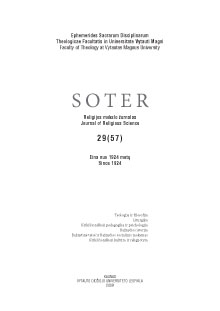Vincas Kudirka: katalikiškųjų ir tautinių vertybių jungtis (dr. Vinco Kudirkos 150-osioms metinėms)
VINCAS KUDIRKA: BRIDGES BETWEEN CATHOLIC AND NATIONAL VALUES (ON THE OCCASION OF VINCAS KUDIRKAS ONE HUNDRED FIFTIETH ANNIVERSARY)
Author(s): Irena BuckleySubject(s): Christian Theology and Religion
Published by: Vytauto Didžiojo Universitetas
Keywords: Vincas Kudirka; dilema; tautos vienybė; tautinė tapatybė; mokslas; sakralizacija; mitas; Vincas Kudirka; dilemma; national unity; national identity; learning; the sacred; myth
Summary/Abstract: One detects toward the end of the 19th century signs of a clear ideological differentiation among Lithuanian intelligentsia. Two kinds of intelligentsia, secular and confessional, vie for the right to determine the fate of the nation. God or country, this is the dilemma that surfaces in public discourse. Vincas Kudirka is one the major and most distinctive mediators in attempts to resolve this conflict of values. As editor of the newspaper Varpas, he avoided dwelling on religious issues and, in his efforts to resolve questions of national identity, searched for meaningful links between nationality and Catholicism. Kudirka bound his hopes for common undertakings on behalf of the nation to the advent of a new generation of clergy. He believed in collaborative efforts by clergy and laymen undertaken to establish a moral codex for the nation. What was important for him, it was the link between the problem of God and the problem of Evil. At the end of the century, there was a lack of the true spirit of evangelism and examples of Catholic life. Criteria for the assessment of moral life were established for clergy who were his contemporaries. However, their contribution to the Lithuanian culture was acknowledged. Thus, Varpas presents a clearly visible search for means to strengthen the relationships between the clergy and the laymen. Varpas defended the authority of science and sought to open up wider horizons. Kudirka viewed science as sacred: he wrote about science with amazement and admiration. Nevertheless, positivism, which praised natural sciences and elevated practice, remained sensitive to the religious needs of society. Kudirka believed in the possibility to unify scientific thinking and religious worldview Disagreements between the two kinds of intellectuals at the end of the 19th century were not ideological in nature. Te positivist ideas of Varpas were not dissociated from the religious needs of the community. Defining the aims of the newspaper, Kudirka stressed the need to teach the community to think in Lithuanian and to teach Lithuanians to take on an appropriate Lithuanian behavior. He invited his fellow Lithuanians to stress love for the Fatherland. Links between Christian and national values are evident in Kudirka’s poetry; the latter includes Christian moral postulates and Christian imagery transferred to the national sphere. Kudirka speaks urging love for one’s neighbor, unity of the people and the idea of equality in the sight of God. He urges one to care about spiritual and moral development and proclaims his religious respect to the Fatherland. Vincas Kudirka combines ideas of liberalism and tolerance with deeply felt, though not loudly proclaimed, Christian values. He expresses the spiritual experience of a social being. Te possibility thus arises to create myths about Kudirka, such as the myth about Kudirka’s realization of his own social responsibility. Signs of a new humanism are evident in the poetry of Vincas Kudirka;
Journal: SOTER: religijos mokslo žurnalas
- Issue Year: 57/2009
- Issue No: 29
- Page Range: 97-104
- Page Count: 8
- Language: Lithuanian

